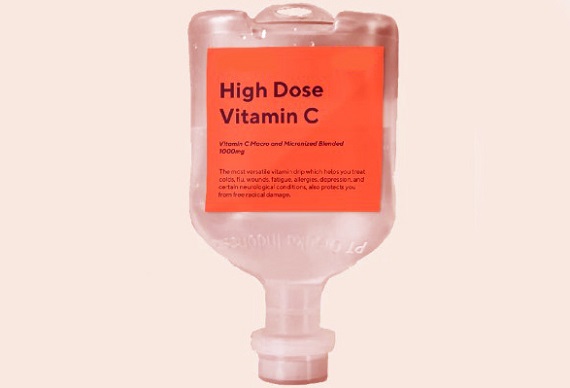Nikhil Prasad Fact checked by:Thailand Medical News Team Dec 13, 2024 4 months, 2 hours, 40 minutes ago
Medical-News: Tendon injuries are not uncommon, especially among aging populations. While young individuals often experience tendon damage due to severe trauma, even minor strains can lead to tendon ruptures in older adults. This difference arises largely because of age-related degeneration in tendons and ligaments. Such degeneration can manifest in various tendons, including the Achilles tendon, rotator cuff, and patellar tendon, leading to pain, reduced mobility, and overall disruption in daily life.
 High Dose Vitamin C as a Potential Ally Against Tendon Cell Degeneration
High Dose Vitamin C as a Potential Ally Against Tendon Cell Degeneration
Degeneration in tendon tissue is often exacerbated by oxidative stress. Reactive oxygen species (ROS), produced during normal cellular processes, can cause cellular damage if not neutralized. Studies have shown that oxidative stress contributes significantly to conditions like Achilles tendonitis and degenerative rotator cuff tears. Consequently, medical experts are increasingly focusing on ways to inhibit oxidative stress to promote tendon health and recovery.
This
Medical News report delves into new findings about the role of high-dose vitamin C in combating tendon degeneration, a topic of significant interest given the antioxidant properties of this essential nutrient. The study, conducted by researchers from Kanazawa Medical University in Japan, provides promising insights into how vitamin C could offer therapeutic benefits in maintaining tendon health.
Exploring the Science of Vitamin C and Tendon Degeneration
Vitamin C, widely recognized for its antioxidant properties, has been studied extensively in the context of tissue repair and immune support. In tendon health, the nutrient’s ability to combat oxidative stress has been highlighted in various studies. However, researchers have debated whether ordinary doses of vitamin C are sufficient to protect against severe tendon damage or whether higher doses may be more effective.
The study involved exposing human-derived tendon cells to oxidative stress using hydrogen peroxide (H2O2) to mimic the conditions that lead to tendon degeneration. Cells were then treated with either a standard dose (150 µM) or a high dose (30 mM) of vitamin C. The researchers meticulously analyzed various cellular markers, including ROS levels, cytoskeletal structure, and mitochondrial health, to evaluate the impact of vitamin C on tendon cell degeneration.
Key Findings of the Study
-Reduced Oxidative Stress and ROS Levels
One of the critical findings was the significant reduction in ROS levels in tendon cells treated with high-dose vitamin C. ROS, known for causing cellular and DNA damage, were drastically lowered in the high-dose group compared to both the untreated group and the standard-dose group. This reduction underscores vitamin C's potential as a powerful antioxidant, capable of neutralizing oxidative stress at a cellular level.
-Preservation of Cytoskeletal Structure
The cytoskeleton, a ne
twork of fibers critical for maintaining cell shape and function, is often disrupted during oxidative stress. In untreated cells exposed to H2O2, researchers observed severe damage to the cytoskeleton, including the disappearance of actin filaments. However, cells treated with high-dose vitamin C maintained their structural integrity, with actin filaments and overall cytoskeletal morphology preserved.
-Enhanced Mitochondrial Function
Mitochondria, the energy-producing powerhouses of cells, play a crucial role in maintaining cellular health. The study revealed that high-dose vitamin C significantly improved mitochondrial function in tendon cells under oxidative stress. Key markers of mitochondrial health, including ATP5A and TFAM, were elevated in the high-dose group, indicating better energy production and reduced cellular aging.
-Regulation of Cellular Senescence
Cellular aging, or senescence, often accelerates in response to oxidative damage. A pivotal marker of cellular senescence, p16INK4a, was highly expressed in untreated cells exposed to oxidative stress. However, high-dose vitamin C inhibited the expression of this marker, suggesting that it could slow down cellular aging processes in tendon cells.
-Improved Cell Viability
Perhaps most importantly, the study demonstrated that high-dose vitamin C significantly improved cell survival rates. While untreated cells showed extensive death and damage, those treated with the higher dose of vitamin C displayed better adherence, fewer signs of stress, and higher viability. These findings suggest that high-dose vitamin C can actively protect tendon cells from degeneration and promote recovery.
Implications for Tendon Health
The results of this study highlight high-dose vitamin C as a potential therapeutic agent for tendon degeneration, particularly in aging populations. By reducing oxidative stress, preserving cellular structures, and enhancing mitochondrial function, this nutrient offers a multifaceted approach to combating the challenges associated with tendon health.
However, it is important to note that these findings were based on in vitro studies. While the results are promising, further research involving animal and human models is necessary to determine the practical applications of high-dose vitamin C in real-world scenarios. Additionally, the study emphasized the importance of cautious administration, as excessively high doses of vitamin C can lead to side effects like gastrointestinal discomfort and kidney stones in certain individuals.
Conclusions and Future Directions
The study underscores the potential of high-dose vitamin C as a preventive and therapeutic tool against tendon cell degeneration. Its ability to neutralize oxidative stress, maintain cellular structures, and improve overall cell health positions it as a valuable addition to the management of tendon-related injuries and conditions.
However, restoring damaged tendons to their original state remains a challenge in modern medicine. This study suggests that early intervention with high-dose vitamin C could inhibit the progression of degeneration, thereby reducing the risk of injuries such as tendon ruptures. Future research should explore the long-term effects of vitamin C on tendon health and its applications in clinical settings.
As a readily available and affordable nutrient, vitamin C holds immense promise for addressing age-related tendon issues. When used under medical supervision, especially in carefully monitored doses, it could become a key player in maintaining musculoskeletal health in older adults.
The study findings were published in the peer-reviewed International Journal of Molecular Sciences.
https://www.mdpi.com/1422-0067/25/24/13358
For the latest on Tendon Health, keep on logging to Thailand
Medical News.
Read Also:
https://www.thailandmedical.news/news/work-related-musculoskeletal-disorders
https://www.thailandmedical.news/news/researchers-discover-tendon-stem-cells-which-can-be-used-for-healing-injuries
https://www.thailandmedical.news/news/southern-illinois-university-edwardsville-study-finds-that-most-exposed-to-sars-cov-2-will-develop-viral-arthropathy-besides-myalgia
